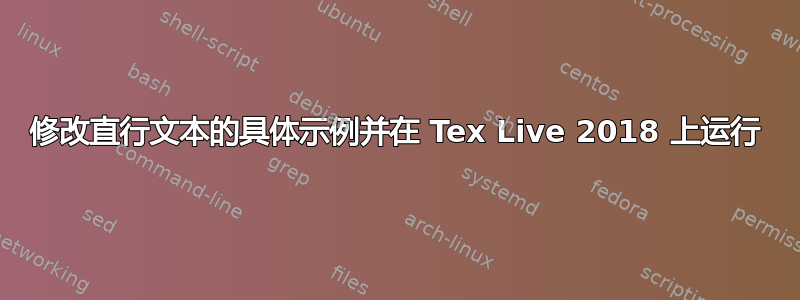
我正在尝试修改这个特定的解决方案以适应直行文本,我发现这里。
% !TEX TS-program = XeLaTeX
\documentclass[11pt]{book}
\usepackage[margin=1in]{geometry}
\usepackage{titlesec}
\usepackage{polyglossia}
\defaultfontfeatures{Ligatures=TeX}
\setmainlanguage{brazil}
\setotherlanguage[variant=ancient]{greek}
\setmainfont{Linux Libertine O}
\usepackage{datatool}
\usepackage{expex}
% Format chapter and verse (\section) headings
\titleformat{\chapter}[display]
{\normalfont\filcenter}
{\LARGE\MakeUppercase{\chaptertitlename} \thechapter}
{1pc}
{\vspace{1pc}%
\LARGE}
\titlespacing{\chapter}
{0pt}{0pt}{10pt}
\titleformat{\section}[leftmargin]
{\normalfont
\vspace{0pt}%
\bfseries\Large\filleft}
{\thesection}{.5em}{}
\titlespacing{\section}
{4pc}{1.5ex plus .1ex minus .2ex}{0pt}
% format section label
\renewcommand{\thesection}{\arabic{chapter}:\arabic{section}}
% multiple gloss lines will align on the left margin
\lingset{glhangstyle=none}
% initialize some token registers to build up the lines from the database cells
\newtoks\glosslineA
\newtoks\glosslineB
\newtoks\glosslineC
% create a command to append a cell to the token register
% Thanks to Enrico Gregorio for this code
\long\def\Append#1#2{#1=\expandafter{%
\the\expandafter\expandafter\expandafter#1\expandafter\space #2}}
% Define a command to empty the token registers
\def\emptytoks{\glosslineA{}\glosslineB{}\glosslineC{}}
% Define a command used to escape * in the input cell
\def\esc#1{#1} %
\def\SecTest{section} % verse delimiter check
\begin{document}
\DTLsetseparator{ }% literal tab; with UTF8 source, \DTLsettabseparator doesn't work
\DTLloaddb{text}{Chapter2.csv}
\setcounter{chapter}{1}
\chapter{O sonhou do Nabucodonsor}
\DTLforeach{text}
{% assign each cell in a row to a macro
\Codes=Number,
\GreekText=Greek,
\PortugueseText=Portuguese%
}
{% If we're in the first row, start a section; otherwise if we find a section, output
% the previous section's lines, and start a new section, then empty the token registers
\DTLiffirstrow{\section{}}{
\DTLifeq{\Codes}{\SecTest}{
\begingl
\expandafter\gla\the\glosslineA//
\expandafter\glb\the\glosslineB//
\expandafter\glc\the\glosslineC//
\endgl
\section{}
\emptytoks
}
{% For each cell, append it to the token register for that line
\Append\glosslineA{\Codes}%
\Append\glosslineB{\GreekText}%
\Append\glosslineC{\PortugueseText}%
}}}
% output the last section's lines.
\begingl
\expandafter\gla\the\glosslineA//
\expandafter\glb\the\glosslineB//
\expandafter\glc\the\glosslineC//
\endgl
\end{document}
首先,我需要让它在 Windows 上使用 Tex Live 2018(我从 DVD 安装了它)。当我尝试在 Texmaker 中运行它时,出现了一条错误消息。
\dtlcols@text=\count308
! Argument of \@dtl@lopoff has an extra }.
但我知道这只是个幌子,因为完全相同的代码在 Linux 下与 Tex Live 2017 完美兼容。我认为问题是由于某种原因 CSV 没有被读取。(我使用的是与该线程中发布的相同的 CSV。)从 2017 年到 2018 年,其中一个软件包的行为是否发生了变化?
答案1
尝试对文档进行以下更改。
注释掉以下行:
\DTLsetseparator{ }% literal tab; with UTF8 source, \DTLsettabseparator% doesn't work
并将其替换为:
\DTLsettabseparator % add this line
然后在加载 CSV 文件后添加以下行:
\DTLmaketabspace % immediately after loading add this line
因此,完整的加载行现在应为:
\DTLsettabseparator % add this line
\DTLloaddb{text}{Chapter2.csv} % load file
\DTLmaketabspace % immediately after loading add this line


